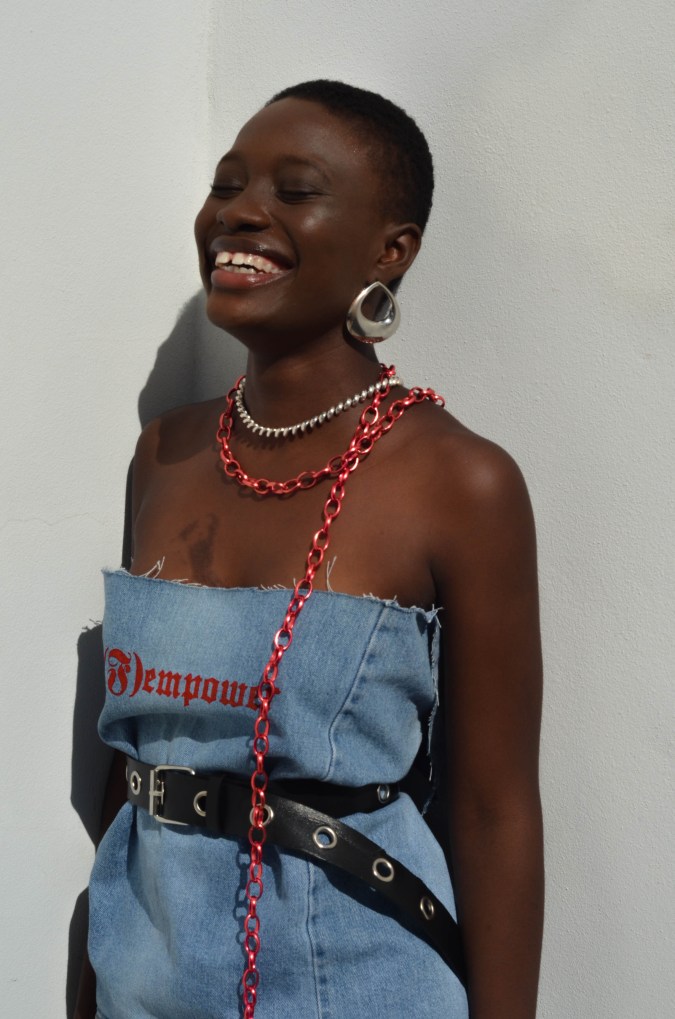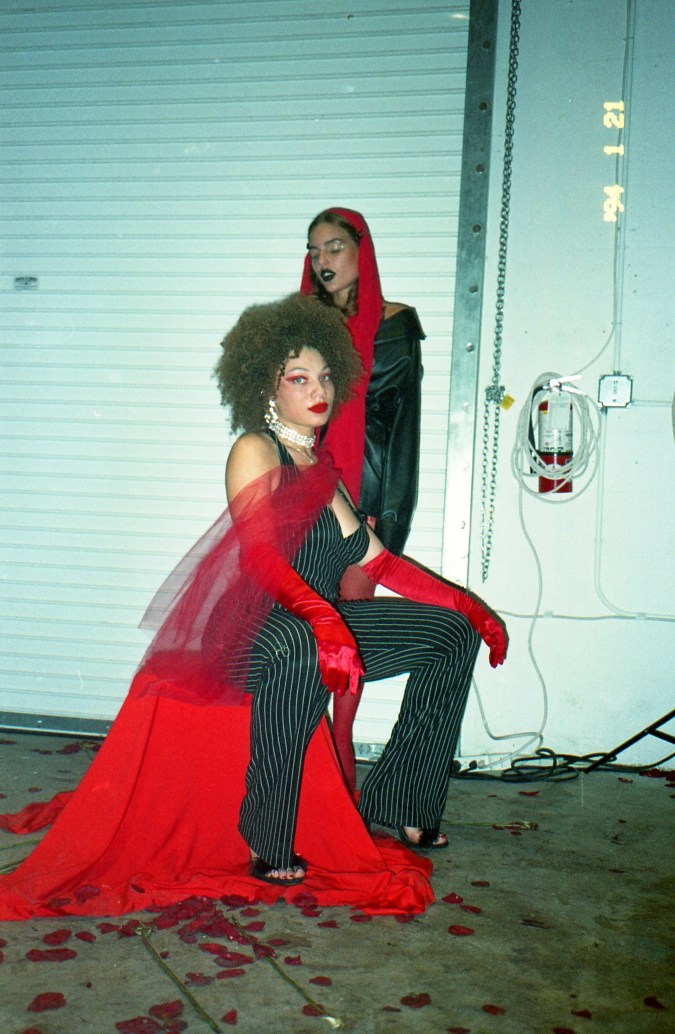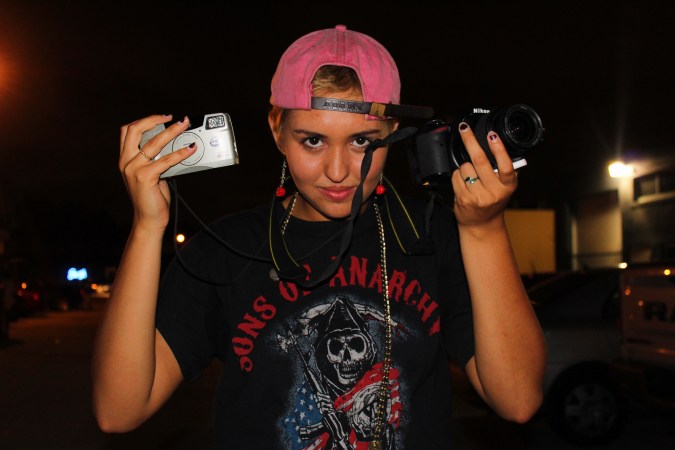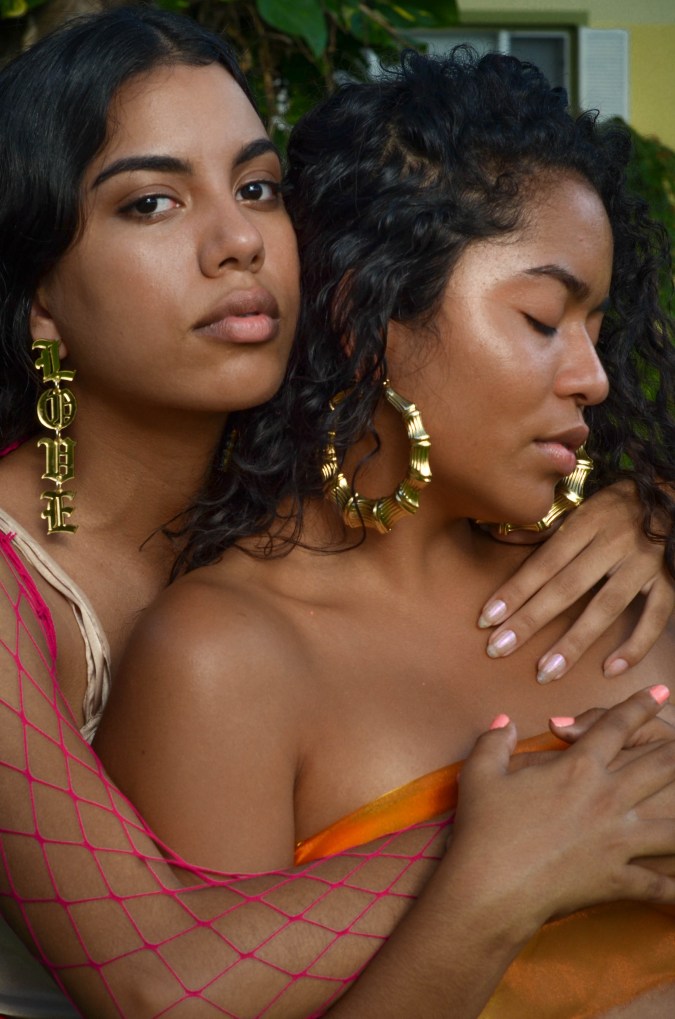An uncharacteristic fog hangs over a Miami coastline littered with glitzy, soaring hotels. With a bottle of red wine in hand and the warm waters of the Atlantic Ocean lapping over the sands of Miami Beach, Helen Peña reflects on her mission, her Dominican heritage, and the state of affairs for femmes in the Magic City. After a sip of wine she explains with a subtle smile, “I wish Miami was a more maternal place.”
Just a few months ago, on a typically warm Florida night, Peña produced the launch party for her brainchild, (F)empower. In a repurposed Little Haiti warehouse, a projector screened voyeuristic images of a woman in tights whose gaze rarely strayed from the camera, challenging viewers to either stare back forcefully or shy away entirely. Installations from Miami artists occupied all corners of the room and deep red rose petals adorned the concrete floor.
Femgaze – the name of the launch party – flipped the notion of the male gaze on its head. With it, it also sought to combat a long, deeply entrenched history of women portrayed solely as objects of male pleasure and desire.

In Helen’s words, “While female bodies are represented, it’s always the man being active in capturing a passive female body. I wanted to look at that exchange of power while meditating on the digital world we live in.”
To many, that party was (F)empower’s introduction to the world and a marked shift in what being a Black and/or Latinx femme in Miami could be and what that dynamic might look like. It was a space that made the photoshopped bodies on South Beach nightclub fliers feel like a distant memory or a small grain of sand.

In a city so reliant on money from tourists – many of whom are searching for a sexxed up, unrealistic, bodytoned taste of the Caribbean – (F)empower’s vision feels like an affront to the city’s most toxic attitudes and its most reliable revenue streams.
“While female bodies are represented, it’s always the man being active in capturing a passive female body.”
“There’s a tension between the Miami I grew up experiencing – the food prepared by women, the warmth they emit and the culture they carry with them home – and the artificiality [prevalent in Miami] that stems from subscribing to a patriarchal, consumerist society.”
It’s that duality that has made her message resonate on such a personal level for so many in South Florida. The pressure to look like a video vixen is there but so too are the Dominican, Haitian, and Cuban matriarchs who give the city its distinct energy.
Still, as is the case for many women of color, Helen’s journey to radical politics was not one carved out by leftist parents or gender-bending, new age schools. It was borne, at least in part, as a response to both a eurocentric society and the machismo and misogyny present in the Latinx community. For queer femmes and/or women of color, “intersectionality” isn’t a buzzword — it’s a fact of life.

Since the launch, Peña has spoken at Breakthrough summer camps, interacting with young women of color about a future they can help create, and she’s helped reclaim Miami’s famed Swim Week for women who fall outside of the popular “beach body” paradigm.
With so much progress in such a short period of time, it’s easy to overlook that this all started with a call to action — a blog post about racialized state violence — that turned into a highly stylized, evocative zine. By taking those initial steps herself, Peña has lifted the curtain and fanned the flames on an underground scene in South Florida ready to combust.

Now, just a few months after that initial push, those seeds have helped Peña and (F)empower produce content and events for a queer, femme scene clamoring for spaces to engage and opportunities to collaborate. On September 28, for example, the collective hosted Erotismo, a “sex art show from the female gaze.”
Still, (F)empower’s penchant for bringing people together hasn’t healed all wounds. Weeks after Hurricane Irma struck Florida, downed streetlights, seaweed, and debris served as a reminder of the destruction left in the wake of the natural disaster. Peña recounts the day she came back to South Florida after evacuating the area.
“I just wanted to feel the bliss and warmth of being back home, but I never expected to face piles and piles of trash washed up on the shore. In that moment I just felt all this pain — like the pain of mother Earth.” She goes on to explain how Irma reinforced her belief in the importance of (F)empower: “‘Femininity’ is what’s going to save us – caring, creating, feeling and giving.”
Then, with the lights from the bloated, exorbitant hotels reflecting on her face and the soft crash of waves reaching further and further up the shore, she finishes, “I just want to re-instill the humanity in us all and give back to the OG femme – muva Earth – because without her, nothing would exist.”




